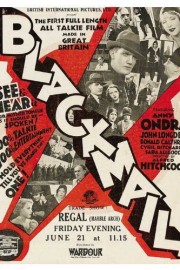Blackmail
You know you aren’t necessarily going to get “classic” Hitchcock when you dive into the British thrillers he made during the ’20s and ’30s. I don’t mean in terms of quality, but in terms of aesthetics. The rich visual pallets, the star power that defined his Hollywood classics, the distinctive musical scores, and the common themes that we associate with the Master of Suspense. Actually, you are likely to get those, as he was already going deep into them with his ’30s version of “The Man Who Knew Too Much” and “The Lady Vanishes,” and in the film of his I watched this morning from 1929, “Blackmail.” As it took the rest of the world a couple of years to get out of the silent era, this Hitchcock thriller was originally going to be a silent film, but he decided to transition it into sound during production. That original silent impulse is alive and well in the film’s first few minutes, as we watch detectives from Scotland Yard apprehend a suspect, but when they get back to headquarters, the soundtrack turns on, and we get dialogue. But it is what goes unsaid between people that will stand out as “Blackmail” unfolds.
The film follows the travails that beset a young woman, Alice White (Anny Ondra), when she meets an artist (Cyril Ritchard) who has his eye on her when she’s having lunch with her boyfriend, Frank (John Longden). The Artist, as he is credited, gets her up to his apartment with the lure of a dress, and doing a painting of her, but he has deceitful intentions. Soon, there is a sexual assault, and a murder. The Artist is dead, and Alice has killed him. She is shocked by the event, and gets home and is in a daze until her boyfriend comes over, knowing what happened. You see, he is a detective at Scotland Yard, and saw a glove of hers at the scene of the crime. He has kept it in hopes of keeping the truth unknown, but a local criminal (Percy Parsons) found her other glove, and is looking to take advantage of the situation from a financial perspective. It then becomes a battle of wills to see what truth will be revealed, and how.
The film is based on a play by Charles Bennett, and it maintains it’s rather stagey roots, even in the hands of the great Alfred Hitchcock. Given the story, it’s understandable, but Hitch was capable of pulling more out of less better than pretty much anyone in the director’s chair. His accomplishment here involves the dynamics between Alice, Frank and the criminal when the titular blackmail comes into play, and all three actors do fine work. This is not classic Hitchcock, but an interesting thriller that has elements associated with the director’s best work told in a simple, suspenseful way. He was feeling his way around the art form still, although by the mid-’30s, he was starting to perfect his technique in exciting, masterful ways. “Blackmail” is simply an entertaining lark from a master at the early stages of his career. I’ll take it.










